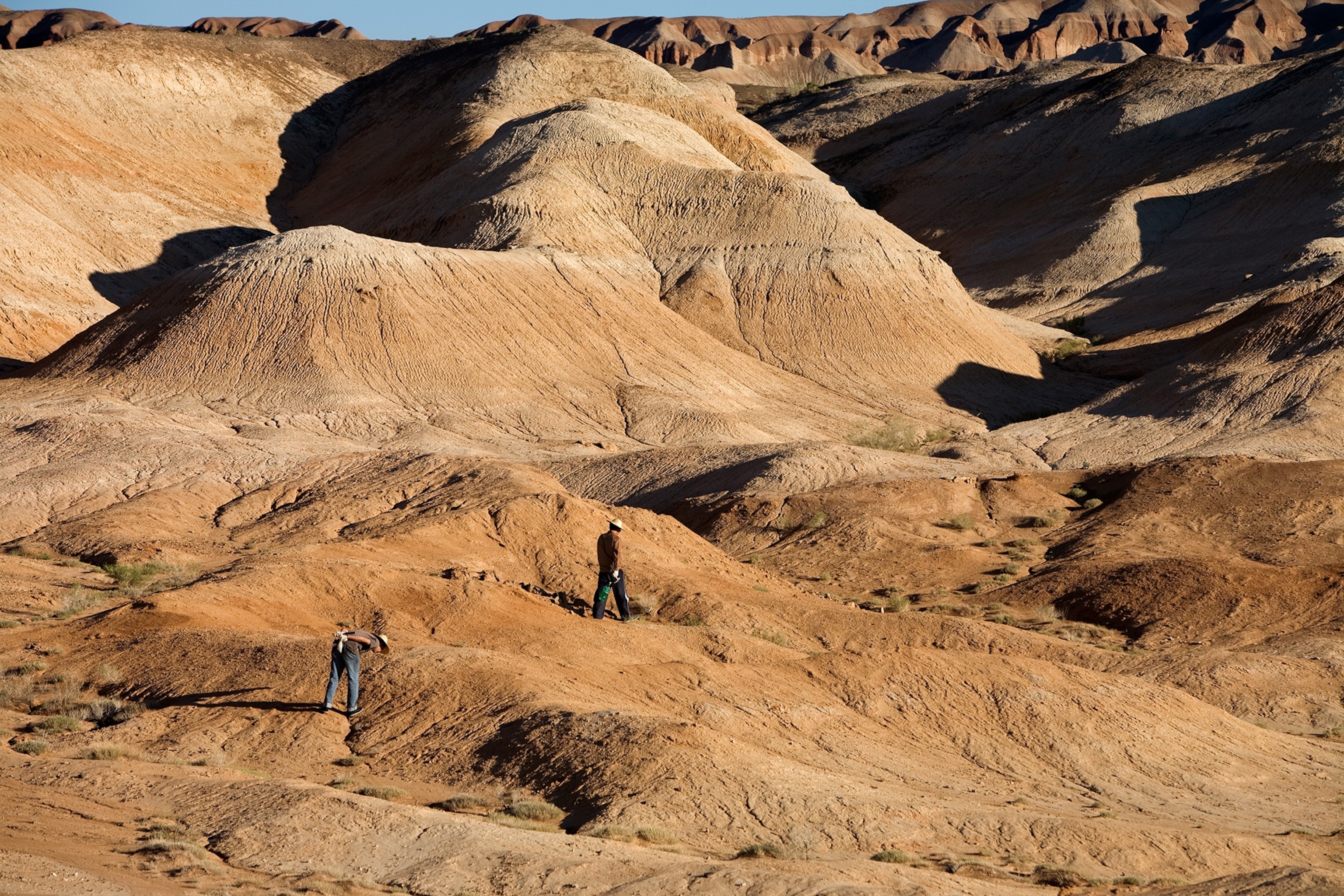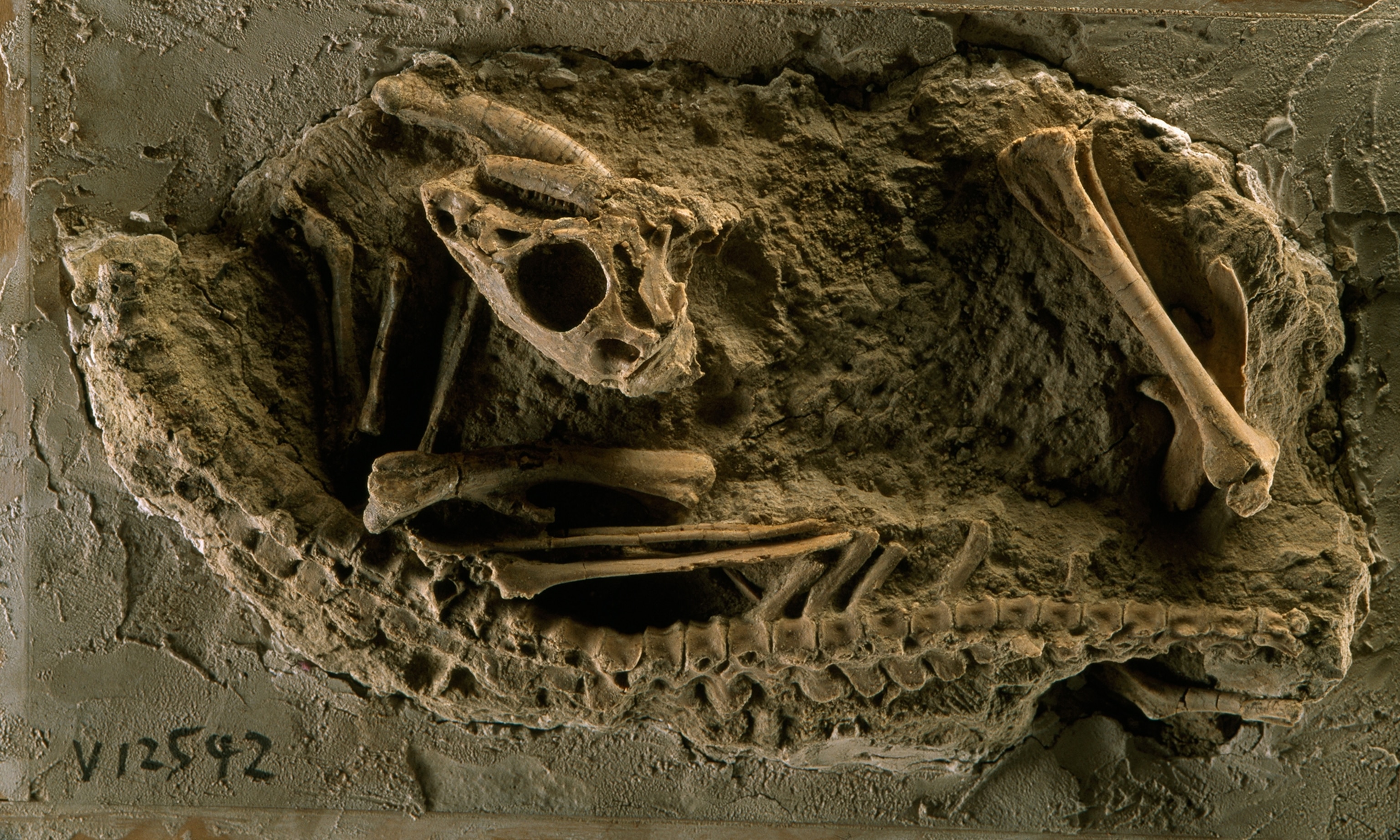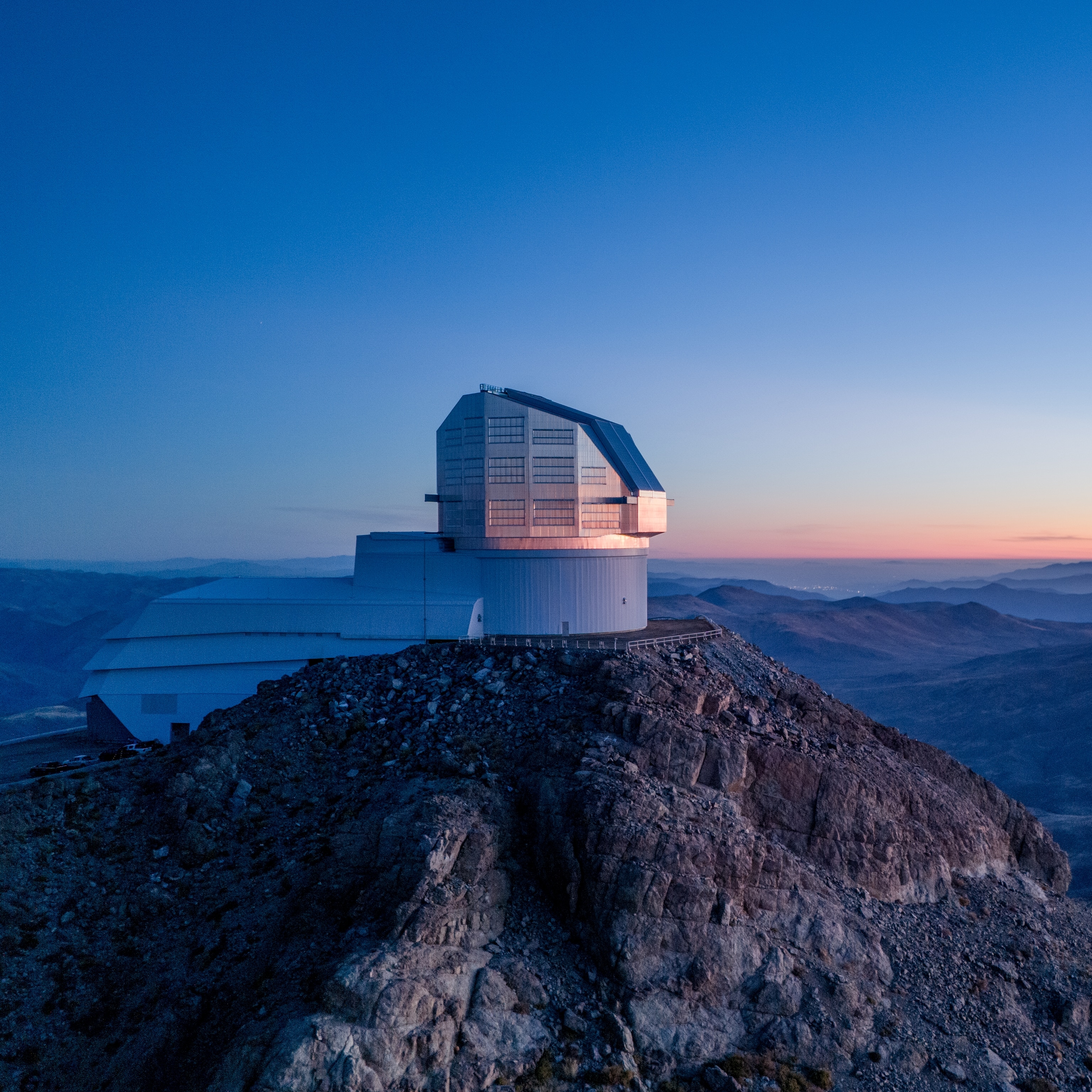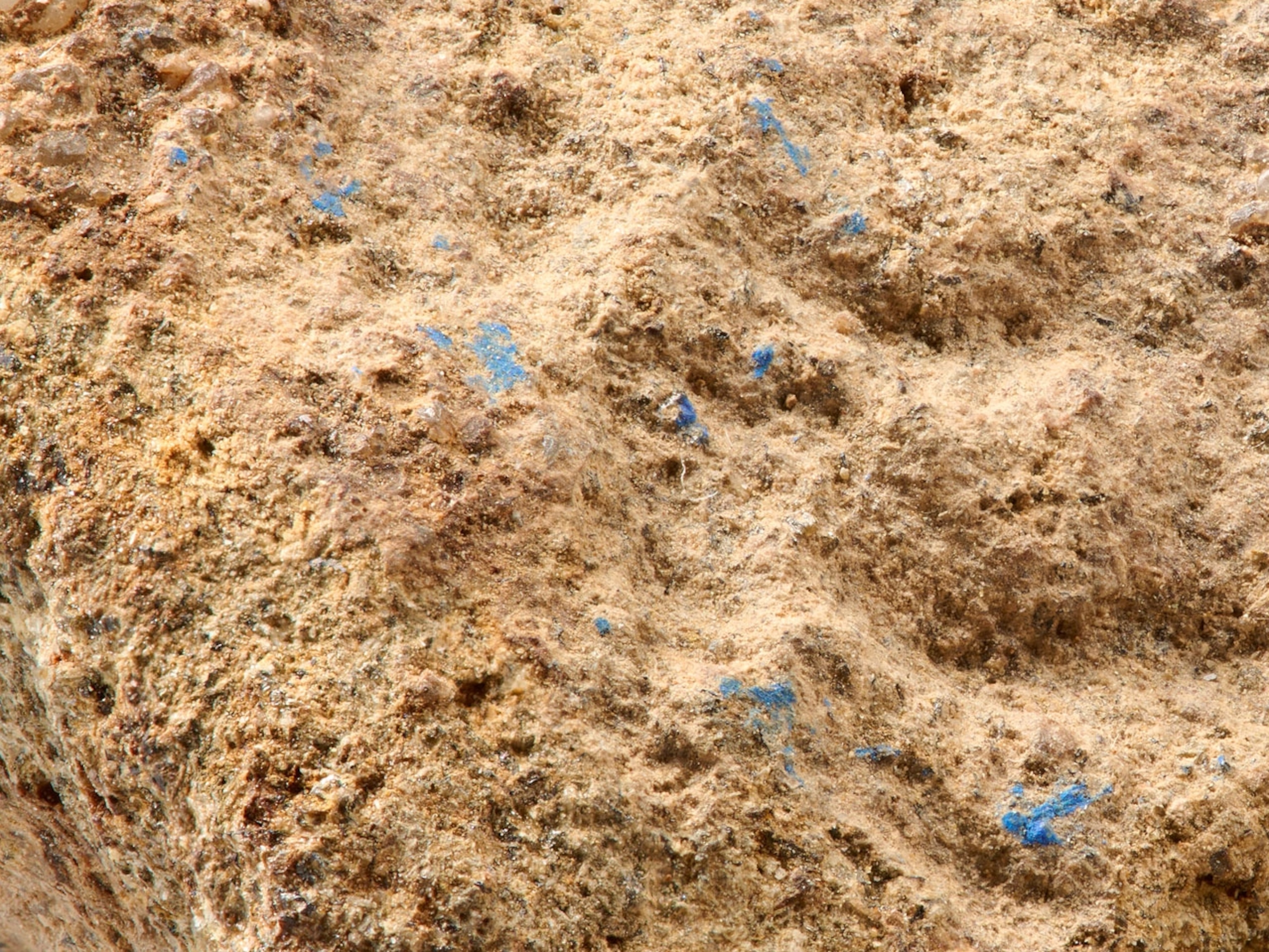
Earth's odd rotation may solve an ancient climate mystery
A geologic change might have plunged lush landscapes into arid zones, killing off an array of creatures—and it might happen again one day.
At first, it seems like a case of extinction by climate change: More than 160 million years ago, during the Jurassic period, a fanciful menagerie crept, swam, and flew through the cool, damp forests of what is now northeastern China. Then, almost in a geologic instant, the air grew warmer and the land dried out. As the water disappeared, so too did the life. And yet, researchers have struggled to pin down a climate-related culprit behind this ecological collapse.
Now, a study published in the journal Geology suggests that it wasn’t the climate that changed, but the geographic location of the landscape. Paleomagnetic signatures in the area’s rocks indicate that sometime between 174 and 157 million years ago, the whole region shifted southward by a startling 25 degrees, plunging once lush landscapes into zones of desiccating heat.
The ancient rocky lurch was part of a phenomenon known as true polar wander, in which the topmost layers of the planet, likely all the way down to the liquid outer core, rotate significantly even as Earth continues its daily turn around its usual spin axis.
In the Jurassic, the surface and mantle made this twist around an imaginary line through the crook in Africa’s west coast known as the Bight of Benin. The change would have been massive: If a similar shift were to happen today, a flag planted in Dallas, Texas, would end up where Northern Manitoba, Canada, currently sits. On the other side of the world, the continent of Asia would soar southward.
Earth has likely experienced smaller amounts of true polar wander throughout its past, and some scientists think it continues today.
“We’re experiencing true polar wander as we speak,” says Dennis Kent, a paleomagnetist at both Rutgers and Columbia University who wasn’t part of the new study team.
To be clear, these more recent forays are not the source of modern-day climate change, which is driven by humans’ relentless release of greenhouse gasses into the atmosphere. In addition, the magnitude of this Jurassic shift—and whether true polar wander is even a real phenomenon—remain under debate.
“It’s a reasonable area of discussion,” says Christopher Scotese, director of the PALEOMAP Project. “But it’s more controversial than people give it credit for.”
Studying Earth’s past and present geologic wanderings may not only help resolve the controversy, but also improve our understanding of the planet’s complex machinations.
“It’s so important that there’s still fundamental science being done,” says Lydian Boschman, a geologist at Eidgenössische Technische Hochschule (ETH) Zürich who was not a study team member. “If we don’t understand the foundations, then there’s nothing we can do on top of that.”
(This summer has seen the shortest days in Earth’s recorded history)
Twisty-turny past
While deep geologic gyrations can have drastic impacts on Earth’s surface, the planet’s magnetic field remains largely unchanged by such events, since it is generated by the churn of molten iron and nickel in our planet’s outer core, some 1,800 miles below the surface. Researchers can therefore turn to iron-rich minerals attuned to magnetic fields to untangle the planet’s past twists and turns. As sediments collect and solidify or lava cools to stone, these minerals align themselves with the global magnetic field like compass needles, recording a snapshot of a region’s location on our planet at a given period in the past.
But not all rocks are perfect stenographers. As sediments are turned to rock, compression can tweak the magnetic signature and impact their inferred planetary position. By removing this sedimentary confusion and looking only at volcanic rocks, Kent and the late Edward Irving, who worked at the Geological Survey of Canada, found the signatures of a monster jump during the Jurassic period. Their results, published in 2010, suggested that Earth’s surface shifted some 30 degrees between 160 and 145 million years ago.
Subsequent studies started to fill in the gaps in the record, and increasingly it seemed that the entire world was in on the Jurassic mega-shift, with evidence found in modern-day Africa, North America, South America, and the Middle East. But one place appeared to largely stay put: the Eastern Asian Blocks, a zone that includes most of Mongolia, China, North Korea, and South Korea.
“It hardly moved in terms of latitude during that entire period,” says study coauthor Joseph Meert, a paleomagnetist at the University of Florida. “That didn’t seem to really jive well with aridification.”
Part of the challenge was that studies documenting the region’s position with paleomagnetic analyses didn’t sample from a large enough swath of time, Meert explains. While volcanic rocks faithfully record magnetic north, this pole has a tendency to roam, so researchers must average their analyses with data covering several thousands of years to account for these wanderings. (Magnetic north just changed, and here's how we’re trying to keep up.)
The region itself was also frequently excluded in discussions of global change because of its complex history, Kent adds. While the path of other landmasses can be traced back to the supercontinent Pangea, which broke up roughly 180 million years ago, East Asia’s route remains unclear.
“They were doing their own dance out there,” Kent says.
The monster shift
In the summer of 2015 and spring of 2018, the latest team set out in search of a more robust paleomagnetic record to untangle the geologic movements of East Asia, says lead study author Zhiyu Yi of the Chinese Academy of Geological Sciences in Beijing.
Rocks across China tell very different stories, as portrayed by their starkly different hues. The early to middle Jurassic deposits are dark and rich with coal, hinting at a humid ancient landscape chock full of plants. By contrast, the late Jurassic formations hosted rusty red deposits laid down in drier conditions. (Learn about the bizarre fossil finds that revealed Asia’s oldest known forest.)
The team sampled volcanic rocks interwoven into these contrasting formations at a total of 57 sites. In 2017, their analyses confirmed past work that showed the younger red rocks were laid down at low latitudes, where hot and dry conditions likely prevailed, Yi says. But the moment of truth came in the summer of the following year, when they analyzed the older samples and discovered that they formed at surprisingly high latitudes.
“At that moment, I knew what these data mean to us—we finally found the [true polar wander] signals,” Yi writes via email.

Meert admits that he was a little skeptical of the massive shift at the start, but the new findings have him convinced: “We were saying, Yes, yes, this is it,” he says, recalling the time he sat down to dinner with Yi in Beijing to review the data. “The sense of motion and everything just seemed to fit neatly together. So we had a beer and toasted and said, Let’s do this.”
The results suggest that the Jurassic surface rotated by at least 6.7 inches each year, which led to the slow drying of the East Asian landscape that likely killed off many of the region’s ancient plants and animals known as the Yanliao Biota. Past studies hint that another smaller wander around 130 million years ago returned East Asia to temperate climes, setting the stage for the rise of a burst of life known as the Jehol Biota. These exceptionally preserved fossils have yielded many startling finds, including the discovery of the first known feathered dinosaur that was not directly related to birds. (Read about the dinosaurs that didn’t die.)
Spinning futures
“The beauty is that it is very simple,” says Giovanni Muttoni, a paleomagnetist at the University of Milan, Italy, who was not involved in this work but has extensively studied the big Jurassic wander. The motion and magnitude line up with past work, he notes, and they connect mysterious changes in climate with this planetary twist.
However, Scotese isn’t convinced that true polar wander occurred at all during the last 200 million years, arguing that the effects could be explained by the movement of tectonic plates. During the Jurassic period, he says, Asia and North America inched along as if they were on a seesaw that pivoted around Europe. While North America moved northwest, Asia shifted southeast.
“There’s a huge amount of noise in the paleomagnetic database, and often paleomagnetists do all sorts of contortions to try to minimize the noise or correct things that they think are errors,” he says. “I just disagree with that philosophy. I feel that’s biasing the database.”
Others stand firm with the data pointing to true polar wander and the monster shift in the Jurassic.
“They are real,” Muttoni says. “They are recorded in the rocks.”
If so, many questions linger. For one, it’s unclear precisely what drives such a large shift, an event that must involve some significant redistribution of our planet’s mass. Perhaps the birth of subduction zones—regions where one tectonic plate drives under another—drives the wander, Boschman says. Or, it could be due to slabs that have already subducted breaking apart, which would then send pieces of crust sinking through the mantle, upsetting the planetary balance, Kent adds. For now, unraveling the many geological unknowns is all part of the intrigue.
“We’ve got a nice expanding envelope of knowledge, and you try to be at the meniscus where it’s happening,” Kent says. “But in the meantime, you may be out there on a ride.”







